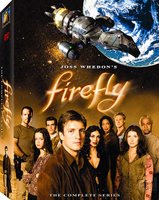TV on DVD: Firefly
Certainly I'm not aglow with happiness over The WB/CW's treatment of Everwood, but there never was a story of more scheduling woe than that of the Firefly and her crew. Dumped on the wasteland that is Friday night, poorly promoted, and aired out of order, Joss Whedon's kick-ass sci-fi Western Firefly suffered right from the get-go. Still, it managed to build a seriously devoted fan base, the Browncoats, and even morph into a decent big-screen hit in the movie Serenity.In a bit of a departure, I'm going to talk about the commentary not from the pilot, but from the episode "Objects in Space," the last episode that was filmed, which has commentary from Joss, who wrote and directed the episode and created the series.
 Joss' commentary is different because it's the most high-level and the least anecdotal. He talks more about the development of the story and what he's trying to achieve dramatically, and how, rather than saying "this scene was difficult to write" or "Nathan kept giggling like a schoolgirl throughout the scene." We hear more about his inspirations and influences, which can be good for people who want to know about the creative process, but bad for people who just want to know the behind-the-scenes gossip.
Joss' commentary is different because it's the most high-level and the least anecdotal. He talks more about the development of the story and what he's trying to achieve dramatically, and how, rather than saying "this scene was difficult to write" or "Nathan kept giggling like a schoolgirl throughout the scene." We hear more about his inspirations and influences, which can be good for people who want to know about the creative process, but bad for people who just want to know the behind-the-scenes gossip.- Joss wanted to do an episode where River really became a part of the group.
- Joss wrote the theme song for Firefly the day before he wrote the pilot, on the day he pitched the show. (My roommate loves this song and sang it often when we were watching Firefly. It, uh, does not get old. Really! Okay, yes it does.)
- When Joss was 16, he had an epiphany while watching Close Encounters of the Third Kind. He just suddenly understood that "real life was happening" right then. He later read Jean-Paul Sartre's Nausea, which spoke to the pain of being aware of things and their existence--just the very fact of that objects exist. We cannot stop existing or changing. "Nothing can exist only slightly."
- Kaylee is an emotional "in" for the viewer; we feel what she feels. Often Mal also serves this purpose of the audience perspective.
- Though they're both killers, what separates River and Early, the bounty hunter, is that she has a heart. River takes the meaninglessness of things and imbues them with a kindness. For Early, he stays detached and dissociated, which is why he's able to do the horrible things he does.
- Of the scene where Early sexually intimidates Kaylee, Joss thought: "This is one of those scenes that you write, and then you worry that maybe you're not as good a person as you thought you were."
- Joss got many thanks for adding the "shirtless Simon" scene to the show. (Yeah...Sean Maher isn't exactly an eyesore.)
- He listened a lot to the score from Gattaca while writing the episode.
- The exchange about the midget arsonist is one of Joss' favorite things he's ever written.
- The moral according to Joss: "If nothing we do means anything, then the only thing that means anything is what we do." That's if there even is a moral, which there really isn't.
- Aloneness (not loneliness) is the most common theme in everything Joss feels and does.
- The long steady shot at the end shows that all the crew is connected, to River as well.
It makes me a bit sad to be posting this on a Friday, when by all rights I should have been posting about how excited I was that a new episode of Firefly was going to air. Boo to narrow-minded network programmers who can't see the potential of a show run by a visionary like Joss.

0 Comments:
Post a Comment
<< Home